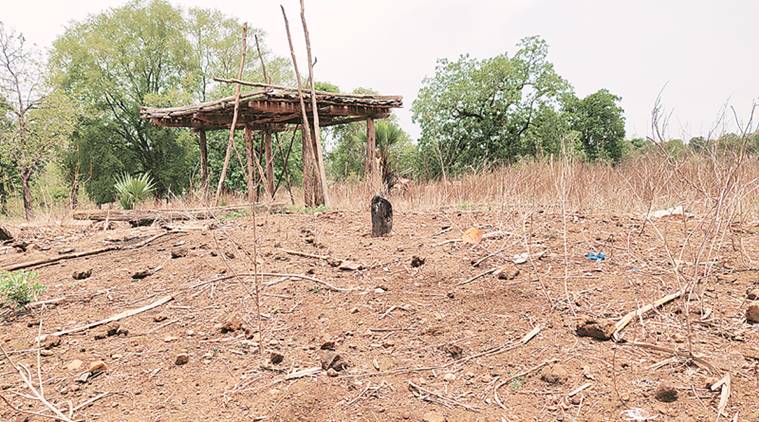
To his left, is his past. All that remains is a wooden stump, charred black and lifeless. To his right, a hundred metres away, is a fresh start. The wood is fresh and brown, and his hut is well on its way to becoming a home. Thirteen years ago, he had fled, taking his family with him. He has now returned, happy but hesitant. He is one of the refugees of Maraiguda in Bastar, his life governed by fear, then and now.
The year was 2006, the month escapes his memory. But that day, as he walked back from the forest, firewood in one arm, his wife behind him, he remembers the smoke rising from the village. “The Salwa Judum had come to the village. The dadalog (Maoists) were there too, and there were gunshots. Our house was among the many that were burning. We ran, until we couldn’t run anymore. And for years, we never looked back,” he said.
Today, the refugee will not say who set the fire to his home — the answer is the difference between life and death. He cannot be named either — for the same reason.
The Salwa Judum conflict, for which the Supreme Court came down heavily on the state in a judgment in 2011, ordering the disbanding of the deployment of tribal youths as SPOs, was one of the most violent periods of Bastar’s bloody history. Many were killed in the conflict, homes burnt, and thousands fled their homes.
There were many such families from Maraiguda, too, deep inside South Sukma. And 15 of them arrived at Kannapuram in Andhra Pradesh. “In Maraiguda, we had land and farming. In Kannapuram, we had nothing. We were forced to live as daily wage labourers, and plucked red chillies in the fields. We went back to our village sometimes, but only fleetingly, afraid of the Maoists. But we always wanted to return. So when the activists spoke to us about it, we said we wanted to go back,” the refugee said.
Shubranshu Choudhary of CG Net Swara, the voice-based online news portal that facilitated the process, said, “We first got in touch with the families during a peace padyatra in October 2018…99 per cent people don’t want to go back to their original villages, which is why we are working towards their forest rights and other related issues. Nine of them from Maraiguda joined us for a second yatra this February. They wanted to go back immediately.”
On April 28, 25 members of the 15 families from Kannapuram returned to the village. They came in a bus, and as he stepped of it, he saw the 68 families that had remained, smile at him welcomingly. “To me, it felt I finally belonged again. We sang and danced that night. And the next day, began to rebuild our homes, and clear the space for our fields,” he said.
Chandan Kumar, District Collector, Sukma said, “The main challenges are to provide basic facilities, basic government schemes, so that people can stay there. We are undertaking several measures, such as ensuring job cards under MNREGA, health camps. People that have returned are being shown their piece of land under government records so that they can begin to farm.”
But soon, however, there was a demonstration of just how complex any rebuilding is in Bastar. Maraiguda is deep in South Sukma, an 8-km journey down an almost unmotorable road from Errabore on the main road. The return of the families brought sudden attention, unwanted by the Maoists.
“They said they had no problem with us coming back, but that too many people were following,” a resident of the village said. Soyam Bajari, the sarpanch who now lives in Errabore out of fear, said, “They said that anyone who asks the government for work, or land, will be killed. I cannot go back because they think I am responsible.”
Then, in May, 25-year-old Kadti Ganga was pulled out of his home and killed. Officials say they are still investigating the killing. “He was killed on the pretext that he was an informer. But the message was clear. To spread fear that they were in charge,” a resident said.
Choudhary of CG Net Swara said, “What happened in the meantime, was that a police team went to the village. They issued a press note saying we welcome them. Maoists came, cut the throat of one man, and from what we think, it was done to induce fear. Then they issued a press note, saying that whoever talks about land, they will kill them. Immediately, all government work stopped,” he said.
Kumar, the District Collector, said, “We are very serious about rehabilitation, where it is organic or artificial. In other areas as well, people are returning to their homes such as from camps in Jagargunda and Bhejji (in Bastar), which are arguably even more left-wing extremism affected.”
However, there are also questions being asked about the “haste” in the process. “These are sensitive matters, and the consequences are dire. We had asked for more time. These things need to happen over time. If no help had been offered, it would have been said that nothing was being done. The police goes to these villages generally to do patrolling and get people on their side. That is their job,” a senior police officer said.
In Maraiguda, the refugee is constantly looking at a man in a white vest, sitting in the vicinity. As the afternoon turns to evening, he walks to his brother’s home. Out of earshot, he turns around, motions to the man in the vest. “He is the dadalog’s man. Please leave. I am happy to be back, but we need to be left alone.”